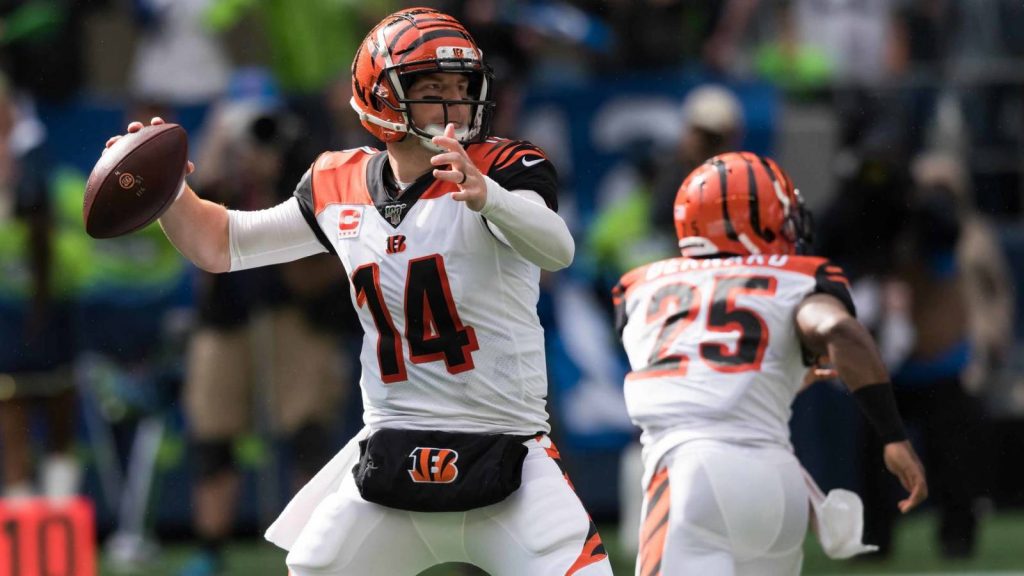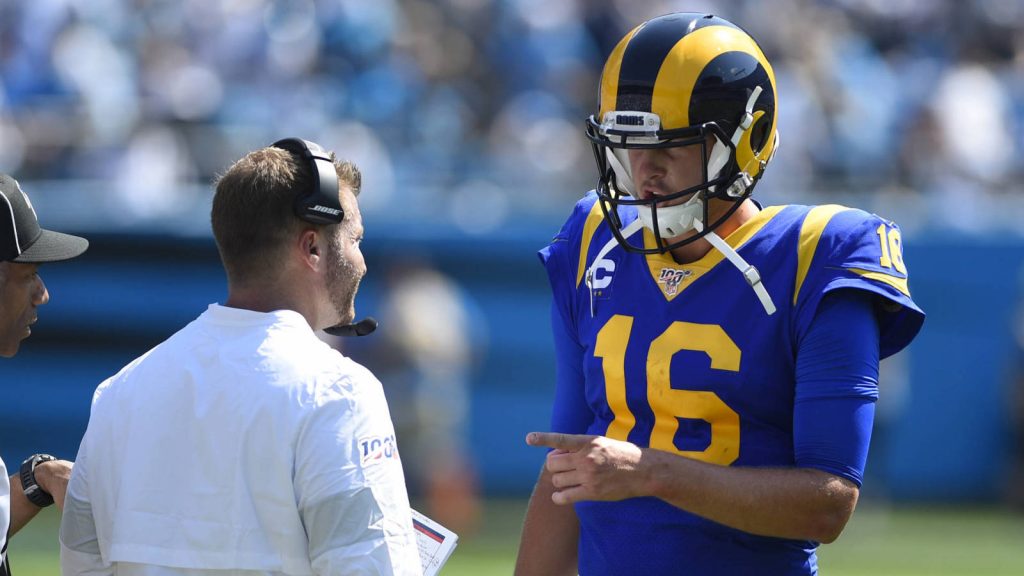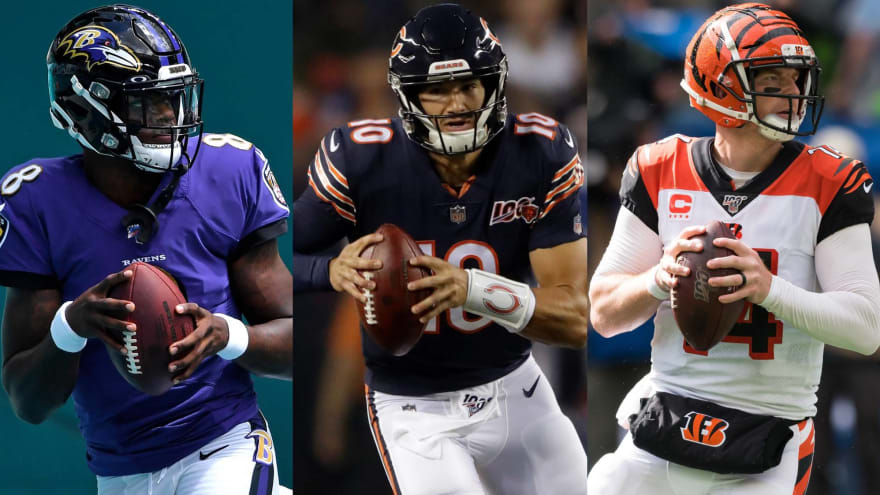Yardbarker NFL writers Michael Tunison and Chris Mueller address some of the hottest issues in the league. This week’s topic: Which quarterbacks shined brightest and tumbled farthest in Week 1?
Mueller: Week 1 in the NFL, as you may have heard, is the time for snap judgments, many of which end up being wrong. Still, it was hard not to be impressed by several quarterbacking performances and underwhelmed, to say the least, by others. The goal, of course, is to figure which efforts are a harbinger of things to come and which are blips on the radar.
First, the good. I was skeptical about Baltimore’s newfangled offense, both in terms of what form it would take, and whether or not Lamar Jackson could stay healthy enough and improve enough as a passer to make it work. And while the Dolphins are doing everything short of actively throwing games in an effort to tank, what Jackson (324 yards passing, five TDs) did to them in Week 1 was still stunning.
Jackson has always thrown a good deep ball, and the Ravens had things schemed up such that he had multiple opportunities to cut it loose, and he took full advantage. His 83-yard TD pass to Marquise Brown was beautifully arced, and even took into account a bump that Brown had to fight through well into his route. Far more impressive was his first touchdown hookup with Brown, a 47-yard play that saw him place the ball perfectly on a slant route, giving Brown a chance to catch the ball out ahead of his body and in stride, and go the distance.
If the pass had been thrown anywhere else, it might still have been a completion, but it wouldn’t have gone for a score. Again, it was only Miami; teams will adjust, and Jackson — who faces Arizona in Week 2 — won’t always have all day to throw, but if he keeps up a pace anything remotely close to this, Baltimore might successfully defend its AFC North title.
On the flip side, I’d be concerned if I were a Chicago Bears fan. The defense is great, but Mitchell Trubisky did nothing to impress in the 10-3 loss to Green Bay in Week 1. Pro Football Focus’ passing grade for Trubisky was 53.8 — a bad number, yet one that still seemed generous. He was terrible under pressure, terrible against the blitz, and showed no ability to make big plays. The Bears went 3-for-15 on third downs, and Trubisky — who faces a good Broncos defense on the road in Week 2 — consistently failed to fit the ball into tight windows.
Chicago’s chances of being a serious NFC title contender hinge on Trubisky making big strides, and for one game, he looked overmatched. His interception wasn’t an unlucky one, either. He stared down Allen Robinson, and made it easy for Adrian Amos to play center field and make the pick. The staredown was enough of a rookie mistake.
What’s just as bad is the fact that Trubisky, knowing he had two downs to get 10 yards, could have thrown underneath and taken a chunk, then had a more manageable do-or-die fourth down. He didn’t, and the game was functionally over after that. This is Trubisky’s third season — we need to see much more.

Tunison: Probably the most overlooked of the new head coaches going into 2019 was the Bengals’ Zac Taylor, who had come over from the Rams, for whom he served as quarterbacks coach in 2018. There are several reasons for why this might be — the Bengals are hardly the most popular franchise in the league, but also because even in Marvin Lewis’ protracted stretch of moderate success, there was an understanding that the team hit its ceiling. In part, that was due to good but not great coaching, but also good but not great quarterbacking.
In some ways, the Bengals are caught in the same purgatory a team like the Lions is: They have a middle-of-the-pack starting quarterback who is just good enough to keep his job forever, but never contend for a championship. Andy Dalton is in his ninth season. How did that happen? There have been a few times his status as starter has been threatened, but ultimately the Bengals decided to ride it out.
Clearly the idea of hiring a coach with a background helping QBs was a last-ditch effort to make an honest go of it with Dalton. In Week 1, though the team ultimately fell short in Seattle, he looked pretty good. He threw for two scores and 418 yards. The main concern was a lack of protection, as he was sacked five times, including one on the final possession that resulted in a fumble that iced the game.
This was without the services of A.J. Green and left tackle Cordy Glenn. The Seahawks no longer have the Legion of Boom, but still on the road, given the circumstances, this was about as encouraging as it could be for Dalton, save for perhaps also coming away with a victory.
On the flip side, there’s Matt Ryan and the Falcons’ offense. They dumped Steve Sarkisian as offensive coordinator and brought back Dirk Koetter, whom the Falcons had success before he had an unremarkable stint as the Bucs head coach. With a supposed return to offensive competence, the Falcons responded with 12 points in Week 1 against Minnesota, and Matt Ryan had his first multiple-interception game since December 2017.
Atlanta stunk up the joint in the first half, trailing 21-0 at the break. This is a team with immense talent on offense, one of the best receiving tandems in the league, and a quarterback who falls just outside the accepted group of elites. Ryan had a chance to possibly get Atlanta into the game early in the second half, only to throw a red- zone interception on the first possession of the third quarter.
On the second-down play, it was hard to tell whether Ryan was trying to throw it out of the back of the end zone and live for third down or make a sincere attempt to fit one in. Either way the result was essentially a game-ending blunder. Ryan is obviously secure for the foreseeable future, but there’s only so much blame that can be pinned on coordinators for the failure of what should be a dynamic offense.
Mueller: What’s most interesting to me about all of the quarterback-centric stories lately is how many of them seem to involve the play-caller as a co-star. Maybe it’s just my memory failing me, but it feels like the fascination with hotshot offensive coordinators or head coaches is a recent trend. Sure, there was Bill Walsh and the West Coast offense, and Air Coryell further back, but aside from Norv Turner and maybe Mike Shanahan, it never felt like the guys calling the plays in the ’90s and early-2000s had household-name status.
With Taylor in Cincy, you almost get the sense that he’ll get more credit than Dalton, because there is a perception that Dalton is already known, and any growth will be Taylor’s doing. Same thing in Arizona, where it’s Kyler and Kliff, not just Kyler. I could go on, but you get the idea.
I don’t want to sound like I’m bemoaning it, either. Feels like a position long described as the most important in all of sports is finally getting the kind of treatment commensurate with such a designation. If you’re trying to find a franchise QB, might as well go all-in on trying to maximize his talents. If that means hiring as head coach a guy they’re comfortable with, like Freddie Kitchens for Baker Mayfield in Cleveland, or surrounding them with players who complement what they do well, like Lamar Jackson and the Ravens, so be it. Better to risk spectacular failure than deal in half-measures.

Tunison: I think the playcaller as co-star trend began, as many recent coaching trends have, with Rams head Sean McVay. He came to Los Angeles having been hailed with guiding Kirk Cousins to respectability in Washington, where he was offensive coordinator, and the idea was that he could do the same with Jared Goff, who was already being discussed as a bust after a disastrous rookie campaign during the last year of Jeff Fisher’s regime. That was probably unfair given that it was just one abbreviated season, and Fisher had an impressive track record of destroying quarterbacks in pedestrian offenses.
Yet McVay has not only rescued Goff, he has gotten almost the entirety of the credit for his success. Part of that is because fans and media can point to the fact that McVay has been said to essentially read defenses for him and call plays up until the point that the coach can no longer communicate with the quarterback over the helmet mic before a play. That perception solidified with last season’s Super Bowl loss, when the Patriots developed a strategy to call a second defensive play after Goff could no longer talk with McVay pre-snap. We all saw how muddled the Rams’ offense was in that game.
Some of that criticism seems valid and yet also somewhat of an oversimplification. Goff, after all, still has to make the throws, and he’s not going to the first read on every play, so no matter how savvy the guidance is from McVay, he has to do at least some of it himself. Moreover, if this strategy were so simple and effective, why has it not been emulated league-wide yet? McVay is billed as a wunderkind, but I doubt his offensive acumen is that much more pronounced than a lot of other head coaches around the league.
By: Chris Mueller and Mike Tunison




